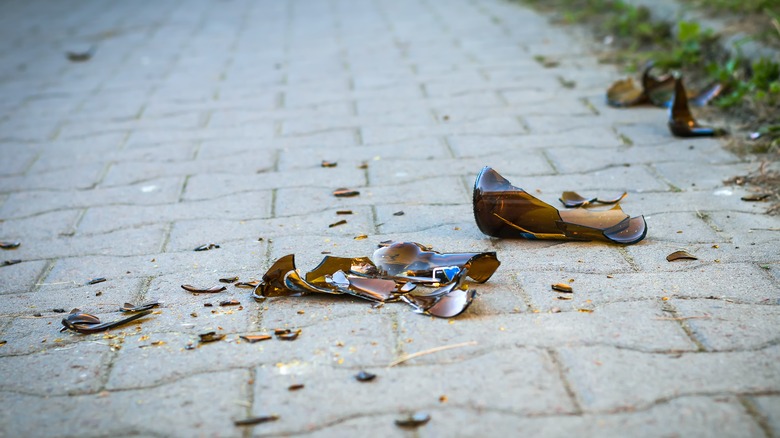Visiting The ER For This Reason Increases Your Risk Of Early Death
A trip to the ER is never fun. For one, you're sick, injured, or suffering from some medical emergency that warrants you getting yourself there. Two, the long wait times don't make anything easier. But have you ever visited the hospital and realized that the reason you were there could also be the reason you're more likely to die early?
According to a 2022 study published in the Journal of Studies on Alcohol and Drugs, if you've been to the ER with an injury and you are inebriated or have alcohol use disorder (AUD), you might be looking at an early death. In fact, you are five times more at risk of dying in the next 12 months when compared with the rest of the population. The researchers looked at data from 2009 to 2012 of California locals aged 10 and older who visited the ER – around 10 million ER visits — and found that out of the 262,222 people who were intoxicated or had AUD, 13,175 (5%) died within the next year.
As Sidra Goldman-Mellor, lead researcher and assistant professor in the department of public health at the University of California in Merced, told Everyday Health, "For every 100 injured patients who were intoxicated or had alcohol use disorder who came to the emergency department, 5 of them died within the next year, versus 1 out of 100 in the comparison population."
How is intoxication and injury related?
You may not think much of a minor slip that hurt your ankle at the Christmas party while you'd had one too many drinks, but alcohol-related injuries can be life-threatening, according to the Centers for Disease Control and Prevention. Road accidents, falls, drownings, relational violence, suicide, and sexual assault are some of the concerns for early death when you're inebriated. Excessive drinking is bad for your health in any case, with dangers like alcohol poisoning, liver damage, and heart disease.
A 2022 study published in JAMA Network Open found excessive alcohol consumption to be the reason for 1 in 8 deaths between 2015 and 2019 in a population aged 20 to 64. Yet another study published in the journal Addiction in 2014 found that alcohol was a "necessary" condition for death in as many as 79,456 deaths in a year in 16 countries across America (via CBC).
According to Sidra Goldman-Mellor (per Everyday Health), someone with AUD or excessive drinking habits may not be getting the support they require. "A lot of the time nobody outside their immediate circle has any awareness that the person is misusing alcohol [...] The person might not even realize their alcohol use is a problem." If your drinking habits are concerning you or if someone you love is constantly inebriated, you're better off dealing with the problem now than turning up at an ER injured.
How to recognize excessive drinking and how to get help
There are signs you can watch out for when it comes to identifying an excessive reliance on alcohol or AUD. With the latter, you might not have control over how much or how often you drink because of chemical alterations in your brain brought on by prolonged excessive alcohol consumption, per Medical News Today.
Are you unable to think of anything else other than the next drink you can get? Is alcohol consumption getting in the way of your normal life, work, and relationships? Are you irritated when others around you comment on your drinking habits? Do you keep needing more and more alcohol to get the same level of intoxication you're after? Do you experience withdrawal symptoms like sweating, nausea, and shaking when you haven't had a drink in a while? Do you try to quit and fall off the wagon often? All of these are signs that you might be drinking too much.
Katie Witkiewitz, a psychology professor at the University of New Mexico, told Forbes that admitting it to yourself is the first step. You will need the help of friends and family if you want to avoid the risk of early death. Eliminate all alcohol from your home and avoid triggers, say no to parties that might involve alcohol, and seek professional help when needed.
If you or anyone you know needs help with addiction issues, help is available. Visit the Substance Abuse and Mental Health Services Administration website or contact SAMHSA's National Helpline at 1-800-662-HELP (4357).



